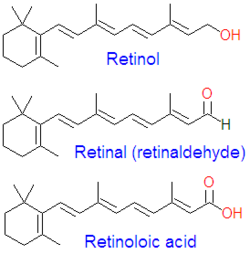Vitamin A
Jump to navigation
Jump to search
Vitamin A, or retinol, is the immediate precursor of two important biochemicals, retinal and retinoic acid. Ultimately, retinol is derived biochemically from carotenes such as-carotene, but is not derived from similar carotenoids such as lutein or zeaxanthin. Retinal plays a critical role in vision, while retinoic acid is an intracellular messenger chemical that affects gene transcription. Although plants do not produce retinol, they do produce carotenes which can be converted to retinol in the gastrointestinal tract.
Physiological Effects
Deficiencies of vitamin A has been associated with a number of maladies related to[1]:
- Vision: Retinal is a critical structural component of rhodopsin, the light sensitive (purple vision) pigment within rod and cone cells of the retina.
- Infections: Vitamin A has an anti-infective effect.
- Skin: Epithelial cells require vitamin A for differentiation and maintenance - lack of vitamin A leads to keratinized and scaly skin, due to impaired gene transcription due to insufficient retinoic acid.
- Reproduction: Vitamin A is essentially for the production of sperm and normal female reproductive cycles.


